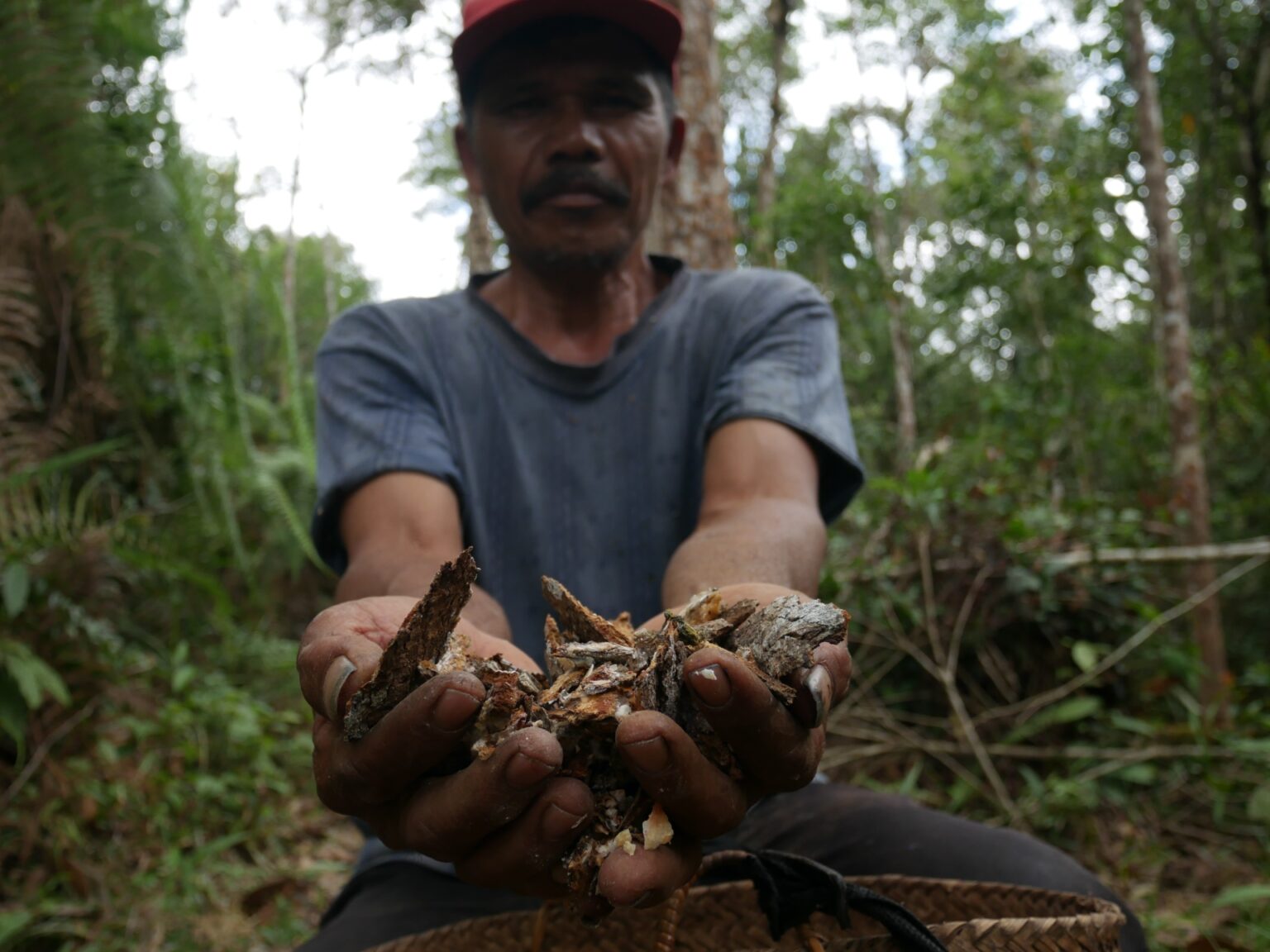Global Courant 2023-04-14 05:11:44
Pargamanan-Bintang Maria, Indonesia – Pardamean Simanullang, a 52-year-old incense farmer in North Sumatra, Indonesia, demonstrated how the shape of the dried frankincense sap was elongated and thin.
“In the past, the incense sap from here was on average the size of a fist,” Simanullang, who lives in the Pargamanan-Bintang Maria hamlet in the Parlilitan district, told Al Jazeera. “When it was dry it could be used as a foothold to climb and get the incense sap from above.”
Simanullang recalls how residents in the 1990s enjoyed abundant income from high-quality incense – enough for families to send their children to university.
That changed, residents say, when PT Toba Pulp Lestari (TPL) – formerly PT Inti Indorayon Utama, one of the largest pulp and rayon-producing companies in Indonesia — obtained a concession permit from the Indonesian government, and gradually began planting eucalyptus for pulpwood upstream, including on traditional community land.
“The frankincense trees that grow there have been completely cut down and now eucalyptus is planted. We are very surprised,” another villager, Amir Joel Simbolon, told Al Jazeera.
KSPPM, an Indonesian NGO that represents local communities in North Sumatra, argues that the concession is illegal and in violation of Indonesia’s constitution, which recognises local communities’ customary land rights. Despite this, residents’ attempts to use legal means to regain their land, or receive compensation for lost income, have been unsuccessful.
Eucalyptus from here and across Sumatra is sent to TPL’s factory near Lake Toba, which produces dissolving wood pulp (DWP), a key material in the production of viscose, which is turned into rayon fibre. But due to growing concerns about sustainability, in recent years, the main destination for Indonesian DWP exports has been China, where there are few requirements around sustainable sourcing.
Some of the material is going to Xinjiang, a major producer of the world’s rayon, where activists say it is likely used in factories run using the forced labour of the Uighur ethnic minority.
Indonesia’s wood pulp industry has been blamed for deforestation and the displacement of communities from their land (Nithin Coca/Al Jazeera)
What is happening in Pargamanan-Bintang Maria is not unique. TPL is owned by Royal Golden Eagle (RGE), an Indonesian conglomerate founded by one of Asia’s richest men, Sukanto Tanoto. Since the 1990s, there have been numerous allegations of illegal land seizures, deforestation and other human rights abuses linked to TPL and another RGE paper pulp subsidiary, APRIL, based in neighbouring Riau province. RGE operates all of the leading factories in Indonesia that produce DWP for export, according to experts and official trade figures.
According to the Indonesian environmental non-profit WALHI, APRIL’s concessions overlap with local or Indigenous community land in at least 114 places.
Meanwhile, TPL alone has encroached on at least 25,000 hectares (62,000 acres) of Indigenous and community forest, with devastating effects on those communities, according to KSPPM and AMAN Tano Batak, another Indonesian NGO. They have also identified dozens of Indigenous peoples around TPL’s concession area who are still struggling to get recognition from the government for their customary forest ownership status.
In many cases, the land was taken without the consent of Indigenous communities, as in the case of Pargamanan-Bintang Maria. Those communities that stand up to companies often face repercussions from the police, according to Tongam Panggabean, the director of BAKUMSU, an Indonesian legal aid non-profit focused on social and ecological justice.
“There is a threat of criminalisation against people who struggle to defend their land against these claims,” Tongam told Al Jazeera.
After cotton and plastic-based fibres like polyester, plant-based rayon is the third-most widely used material, taking up 5-6 percent of the global market. It is also a growing industry – the market is expected to expand by about 5.5 percent a year between now and 2030 due to increasing demand from apparel, home furnishings and industrial use, according to an industry report from market research firm Data Intelo.
Sustainability has become a growing concern alongside the industry boom.
Indonesia exported 99 percent of its dissolving wood pulp to China in 2021 (Nithin Coca/Al Jazeera)
“Both Toba Pulp and APRIL are considered high risk for viscose producers,” Nicole Rycroft, the founder and executive director of the Canada-based forest non-profit Canopy, told Al Jazeera.
“There is active deforestation, and both companies have significant community conflicts associated with their operations.”
Canopy, which has worked with companies since the early 2000s to reduce deforestation risks, now counts more than 500 brands who have committed to removing deforestation-linked viscose from their supply chains and not sourcing from “red shirt” sources, like TPL and APRIL.
These brands include H&M, J Crew, Zara and Eddie Bauer. The non-profit says its efforts have produced a remarkable change in supply chains, with 53 percent of global viscose production now classified as green.
However, this shift has not affected RGE, and TPL and APRIL remain among the producers of DWP globally with the highest deforestation risk. The reason? Many companies in China, Indonesia’s largest trading partner and the world’s largest producer of rayon, have no such sustainability requirements, according to Matt Zimmer, director of governance research at Newday Impact Investing, focused on Chinese supply chains.
“China has lagged on transparency around ethical sourcing because the requirements of such standards would be in conflict with the state’s goal of increasing its control over business and society,” Zimmer told Al Jazeera.
According to their 2021 report, TPL exported 33,339 tonnes of DWP in 2021, up nearly 50 percent from the 2020 figure of 21,452 tonnes. APRIL does not separate DWP from other forms of paper pulp it produces, but, with a much larger facility than TPL, likely exports even more.
Indonesia exported 1.124 million tonnes of DWP, or more than 99 percent of the total, to China in 2021, according to data from the World Bank’s Comtrade. The 2021 figure was almost twice the 630,500 tonnes exported to China in 2019, and is part of a trend – market research firm IndexBox estimates that DWP exports to China have grown by 123.8 percent a year since 2012.
A detention facility in China’s far-western Xinjiang region (Mark Schiefelbein/AP Photo)
While much of that is going to companies like Sateri, a Chinese subsidiary of RGE and the largest viscose fibre producer in the world, at least some is ending up in the semi-autonomous region Xinjiang, where human rights campaigners say up to three million Turkic Muslims, mostly ethnic Uighurs, have been detained in re-education camps.
Xinjiang’s viscose industry is dominated by Zhongtai Chemical Co, which, via its subsidiary, Xinjiang Zhongtai Textile Group, produced about 662,000 tonnes of the material in 2020 alone, accounting for 12 percent of global production.
Zhongtai, which produces almost all Xinjiang viscose, is partly owned by the regional government and has close ties to Xinjiang Production and Construction Corps, a paramilitary organisation that the United States, the European Union and human rights advocates have implicated in the surveillance, mass detention and forced labour of Uighurs.
“Zhongtai is one of the most enthusiastic participants in the (forced) labour transfer programmes in the Uighur region that we’ve ever encountered,” Laura Murphy, a professor of human rights and contemporary slavery at Sheffield Hallam University in the United Kingdom, told Al Jazeera.
According to Chinese customs data, Indonesia was one of the top four sources of DWP to Xinjiang between 2016 and 2019, the last year for which reliable data is available. The official figures may be an undercount, according to analysts such as Murphy, since DWP imported by other companies such as Sateri could be routed via Chinese intermediaries to Xinjiang factories run by Zhongtai.
“Supply chains in China are fairly obscure,” Murphy said. “It’s difficult or impossible to know how things move within China.”
In 2021, an investigation report in the South China Morning Post identified several Finnish companies as the main exporters of DWP to Xinjiang. This led one of the largest producers, Stora Enso, to cut exports to Zhongtai due to forced labour concerns.
Pardamean Simanullang harvests dried frankincense sap used in the production of incense (Nithin Coca/Al Jazeera)
The result could be more Indonesian DWP exports. Over the past decade, there has been a concerted effort to industrialise Xinjiang, and the region is playing an ever-increasing role in the global viscose market, as companies like Zhongtai open new facilities, often in partnership with other Chinese companies. For example, Zhongtai opened a factory with Zhejiang-based Haihong Textile Printing and Dyeing Co Ltd in 2020, which on its website claims to export fabric, including viscose, to the US, Canada, England, Germany, France, Spain, Japan and South Korea.
“Any manufacturing presence in the region is a risk indicator for forced labour,” Nicole Mogret, a human rights analyst at C4ADS, a US-based think tank, told Al Jazeera. “In particular, textiles, including viscose, have been identified as sectors that have strong evidence that forced labour is taking place in them.”
Zhongtai has no transparency sourcing policy, and Canopy ranks it near the bottom for sustainability, with a “Red Shirt” rating. Meanwhile, both TPL and APRIL are looking to expand. APRIL alone plans to open new mills that could result in deforestation rising by 120,000 hectares (296,500 acres) of natural forests every year, according to the Eyes on the Forest coalition of Indonesian environmental groups.
“These companies established their business based on large scale deforestation and land grabbing, and left a trail of a lot of destroyed land and social conflicts,” Sergio Baffoni, a campaigner at the Environmental Paper Network who focuses on Indonesia, told Al Jazeera.
In an emailed response, a spokesperson from TPL stated that the company “never committed human rights violations or criminalised Indigenous peoples” and that “operational activities comply with the rules set by the regulators in a sustainable manner, both related to the environment and the socioeconomic community”.
Similarly, APRIL also denied any environmental or social violations, referring to its response to Canopy’s 2020 report, which stated that there were no deforestation-linked materials in their supply chains and that there is no evidence or basis for claims of “human rights violations”.
Both companies declined to share additional data about their DWP exports, pointing to their publicly available financial reports. Zhongtai did not respond to requests for comment.
Mogret said it is unclear if global brands are aware of the risks in the viscose industry. While laws like the US-drafted Uyghur Forced Labor Prevention Act restrict imports from Xinjiang itself, viscose sourced from other parts of China could be either mixed with Xinjiang viscose or be produced in facilities participating in the labour transfer scheme.
Pargamanan-Bintang Maria is the site of a concession for the growing and harvesting of eucalyptus trees (Nithin Coca/Al Jazeera)
“It’s very hard to trace the movement of goods within China’s supply chain,” Mogret said. “So it’s reasonable to think that there’s a considerable amount that’s moving into the supply chain and potential transhipment in China itself. You can’t really divide Xinjiang and China.”
Similarly, Murphy is concerned that global brands are not yet doing enough to monitor the viscose supply chain.
“We’ve identified hundreds of (viscose) fibre manufacturers in the Uighur region, and we see that many of those companies are global suppliers,” Murphy said. “And so there’s no question that the enormous amount of fabrics that are being made in the Uighur region are making it into the world.”
One thing appears certain – China, with 66 percent of global viscose production, is likely to continue to arouse concerns about its supply chains.
Viscose producers outside of Xinjiang, including Sateri, part of Royal Golden Eagle, Tangshan, Yibin Grace and Xiangsheng Group, are regularly exporting goods to the US and Europe, mostly to wholesalers.
There is another way that Xinjiang viscose might be reaching global supply chains – via third countries. The top three destinations for Xinjiang viscose are India, Turkey, and Brazil. All three have large garment industries, and Murphy and Mogret believe there is a significant risk that they may be taking Xinjiang fibres and turning them into textile or apparel products for global consumption.
From those countries, it is possible that Xinjiang viscose is then going to the US and other Western countries that have sanctioned and censured Beijing over its policies in the region. There have been more than 5,000 shipments, including viscose or rayon from India, Turkey and Brazil to the US, since 2015, with receiving companies in recent months including Ikea, H&M, Hugo Boss and Asos, according to data from Panjiva.
Murphy believes the current measures being taken by these brands are not enough to ensure they are not using Xinjiang viscose in their products.
“International brands are relying on companies that are either Chinese suppliers themselves or companies that are very much reliant on Chinese companies, to tell the truth about where they’re sourcing and whether any of it comes from the Uighur region,” Murphy said.
This story was produced with support from the Rainforest Journalism Fund in partnership with the Pulitzer Center.








